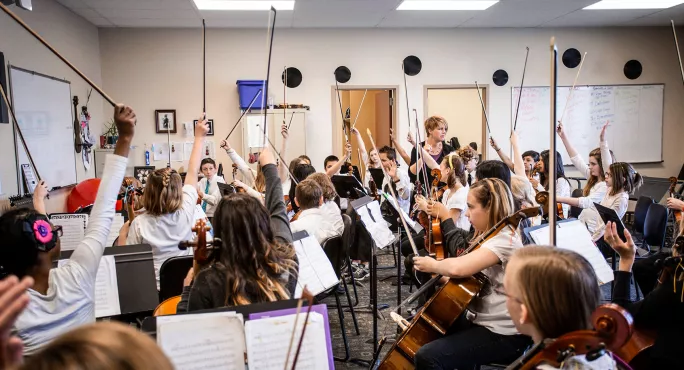Music: Schools need ‘more resources and less accountability’

Headteachers’ leaders have said schools need more resources and less accountability pressure to allow music education to thrive, as the Department for Education unveiled a new expert group to oversee the implementation of its plan to improve teaching of the subject.
The DfE today announced a new music Education Monitoring Board to oversee the rollout of its National Plan for Music Education.
One school leaders’ union welcomed the announcement but warned that the problems with the teaching of music are “deep and systemic”.
- Background: National music plan “impossible” to achieve, DfE warned
- Music plan: Schools get £25 million for instruments under new music plan
- Consultation: Views needed on SEND and tech for new DfE music plan
The new team of experts, chaired by Baroness Fleet (Veronica Wadley), has been formed to track the progress in delivering the commitments in the plan and drive improvement, with the first meeting set to take place later this month.
The plan, which was published last June, sets out a range of expectations for schools, including the aspiration that every school has a designated music lead or head of department, and provides at least an hour of music each week for key stages 1-3.
The National Plan for Music Education
Sarah Hannafin, head of policy for the NAHT school leaders’ union, said: “Schools want to offer a broad and balanced curriculum, including music and other creative arts, which are vital for all pupils.
“But school budgets and curriculum time are both very tight. For the aims of this plan to be achieved, the government will need to ensure schools have the all the resources they need to deliver, including staffing, equipment, capacity and time.”
Julie McCulloch, director of policy at the Association of School and College Leaders, said: “It’s great to see action to promote music education in schools. However, the problems with the teaching of music are much deeper and more systemic.”
Ms MsCulloch said that the government’s approach to performance tables prioritised English Baccalaureate subjects and that “along with severe funding pressures, this is what has driven declines in participation in these courses”.
“The government has effectively sidelined the creative arts, and the action it is now taking is an attempt to repair some of this damage without actually addressing the underlying issues. What really needs to happen is a review of the current accountability measures and an improvement in the level of funding that schools and colleges receive so that they have the resources to be able to deliver the broad curriculum that every child deserves,” she said.
The new panel, which will meet termly, also includes Richard Gill, chief executive officer of the Arthur Terry Learning Partnership and chair of the Teaching School Hubs Council; and Bridget Whyte, chief executive officer of the UK Association for Music Education: Music Mark.
Christopher Stevens, HMI specialist adviser and subject lead for music at Ofsted, will also sit on the panel as an observer.
A progress report will be published by the DfE, on behalf of the board, in 2025.
Schools minister Nick Gibb said:“Every pupil should have the opportunity to be taught a high-quality music curriculum, introducing them to the world’s best music and ensuring they are taught to read and write musical notation.
“Music offers an enriching experience, which is why we want all schools to teach a fulfilling music curriculum. The new board, chaired by Baroness Fleet, will help our schools deliver this by guiding the implementation of the National Plan for Music Education.”
Baroness Fleet said: “I am delighted to be chairing the monitoring board, continuing the work we started in 2021. It is so important to do all we can to ensure that high-quality music is embedded in schools and accessible to young people from all backgrounds.
“This is vital for the pipeline of talent and for the future of our great orchestras, the music industry and the wider creative industries.”
You need a Tes subscription to read this article
Subscribe now to read this article and get other subscriber-only content:
- Unlimited access to all Tes magazine content
- Exclusive subscriber-only stories
- Award-winning email newsletters
Already a subscriber? Log in
You need a subscription to read this article
Subscribe now to read this article and get other subscriber-only content, including:
- Unlimited access to all Tes magazine content
- Exclusive subscriber-only stories
- Award-winning email newsletters



